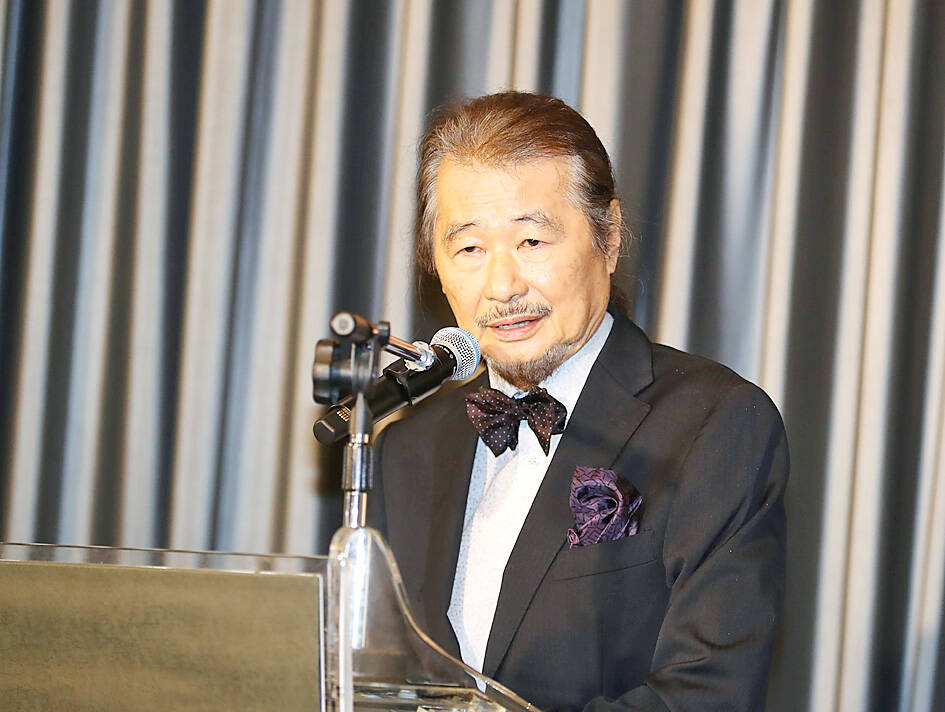President Tsai Ing-wen (蔡英文) and other politicians yesterday mourned the passing of veteran democracy activist Shih Ming-te (施明德).
Shih, a former Democratic Progressive Party (DPP) chairman, died at the age of 83 yesterday after battling cancer for years.
In a Facebook post, Tsai described Shih as a pioneer of democracy and human rights who devoted himself to the democratic movement during Taiwan’s authoritarian period.

Photo: CNA
Taiwan has navigated through periods of political party bans and newspaper restrictions, culminating in the eighth direct presidential election, said Tsai, who visited Shih in hospital on Sunday.
Tsai expressed gratitude to Shih for his dedication, stating that the public would “consolidate all our endeavors and persist in building a better Taiwan.”
Vice President William Lai (賴清德), who won the presidential election on Saturday, also paid tribute to Shih’s contributions and legacy on Facebook.
“Former chairman Shih was a trailblazer for democracy, a staunch defender of human rights, and a wise and courageous politician,” Lai said.
Shih, who dedicated his life and career to the advancement of human rights in Taiwan, has been called the “Nelson Mandela of Taiwan.”
He was jailed from 1962 to 1977 for sedition after calling for Taiwan’s independence from China, and again from 1980 to 1990 for his role in the Kaohsiung Incident.
Shih was chairman of the DPP from 1993 to 1996, and served as a lawmaker from 1993 to 2002.
He split with the party after then-president Chen Shui-bian (陳水扁) of the DPP became embroiled in several corruption scandals, later leading a mass movement calling for Chen’s resignation in 2006.
Chen, who was sentenced to 20 years in prison after being convicted on corruption and bribery charges in 2010, expressed his condolences on social media.
Reflecting on their shared history during the Kaohsiung Incident, Chen said he remembered watching Shih stand strong in front of the military court while serving as his lawyer.
On Dec. 10, 1979, Shih and other opposition leaders held a rally in Kaohsiung to commemorate Human Rights Day and call for democracy in Taiwan. The then-Chinese Nationalist Party (KMT) government cracked down on the demonstration and arrested Shih and the other leaders in what became known as the Kaohsiung Incident.
Chen said Shih had advocated throughout his life that Taiwan should move toward a Cabinet system.
“Prophets often tread a lonely path,” Chen said, expressing his conviction that, given time, Shih’s proposal for Taiwan to adopt a Cabinet system would become mainstream public opinion in Taiwan.
Taipei Mayor Chiang Wan-an (蔣萬安), a member of the KMT, conveyed his condolences on Facebook, adding that Shih had effectively fulfilled a role in monitoring the government, displaying profound compassion for the people residing in this land.

ACTION PLAN: Taiwan would expand procurement from the US and encourage more companies to invest in the US to deepen bilateral cooperation, Lai said The government would not impose reciprocal tariffs in retaliation against US levies, President William Lai (賴清德) said yesterday, as he announced five strategies to address the issue, including pledging to increase Taiwanese companies’ investments in the US. Lai has in the past few days met with administrative and national security officials, as well as representatives from various industries, to explore countermeasures after US President Donald Trump on Wednesday last week announced a 32 percent duty on Taiwanese imports. In a video released yesterday evening, Lai said that Taiwan would not retaliate against the US with higher tariffs and Taiwanese companies’ commitments to

‘SPECIAL CHANNEL’: Taipei’s most important tasks are to stabilize industries affected by Trump’s trade tariffs and keep negotiations with Washington open, a source said National Security Council Secretary-General Joseph Wu (吳釗燮) arrived in the US for talks with US President Donald Trump’s administration, a source familiar with the matter said on Friday. Wu was leading a delegation for a meeting known as the “special channel,” the Financial Times reported earlier. It marked Trump’s first use of the channel since returning to the White House on Jan. 20. Citing a source familiar with the matter, the Financial Times reported that Minister of Foreign Affairs Lin Chia-lung (林佳龍) was also a part of the delegation. The visit came days after China concluded war games around Taiwan and amid Trump’s

CHIP EXCEPTION: An official said that an exception for Taiwanese semiconductors would have a limited effect, as most are packaged in third nations before being sold The Executive Yuan yesterday decried US President Donald Trump’s 32 percent tariff on Taiwanese goods announced hours earlier as “unfair,” saying it would lodge a representation with Washington. The Cabinet in a statement described the pledged US tariffs, expected to take effect on Wednesday next week, as “deeply unreasonable” and “highly regrettable.” Cabinet spokeswoman Michelle Lee (李慧芝) said that the government would “lodge a solemn representation” with the US Trade Representative and continue negotiating with Washington to “ensure the interests of our nation and industries.” Trump at a news conference in Washington on Wednesday announced a 10 percent baseline tariff on most goods

Intelligence agents have recorded 510,000 instances of “controversial information” being spread online by the Chinese Communist Party (CCP) so far this year, the National Security Bureau (NSB) said in a report yesterday, as it warned of artificial intelligence (AI) being employed to generate destabilizing misinformation. The bureau submitted a written report to the Legislative Yuan in preparation for National Security Bureau Director-General Tsai Ming-yen’s (蔡明彥) appearance before the Foreign Affairs and National Defense Committee today. The CCP has been using cognitive warfare to divide Taiwanese society by commenting on controversial issues such as Taiwan Semiconductor Manufacturing Co’s (TSMC, 台積電) investments in the